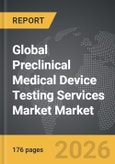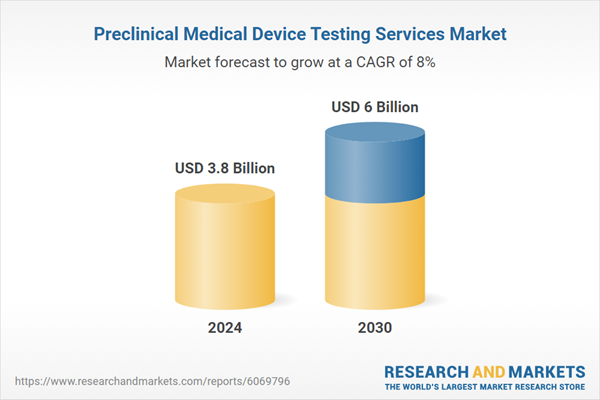Global Preclinical Medical Device Testing Services Market - Key Trends & Drivers Summarized
Why Are Preclinical Testing Services Essential for Medical Device Development?
Preclinical medical device testing services are critical for ensuring the safety, performance, and regulatory compliance of medical devices before they reach the market. These services encompass biocompatibility testing, material characterization, mechanical testing, and preclinical in-vivo studies to assess device functionality under simulated conditions. With increasing regulatory scrutiny from agencies such as the FDA, European Medicines Agency (EMA), and ISO standards, manufacturers are relying on specialized testing services to meet stringent compliance requirements. The demand for preclinical testing has surged due to the growing complexity of medical devices, including implantable devices, wearable health monitors, and AI-driven diagnostic tools. As medical technology advances, ensuring device safety and efficacy through rigorous preclinical evaluation has become a critical step in product development. The rise of personalized medical devices, 3D-printed implants, and smart health technologies is further increasing the need for comprehensive preclinical testing solutions.What Challenges Are Impacting the Preclinical Testing of Medical Devices?
Despite the growing demand for preclinical medical device testing, several challenges impact the efficiency and scalability of these services. One of the major concerns is the high cost and time-intensive nature of preclinical trials, particularly for startups and smaller medical device companies. The complexity of regulatory requirements across different regions poses another challenge, as companies must navigate varying standards for preclinical testing and documentation. Additionally, the limitations of current testing models in replicating real-world clinical scenarios make it difficult to predict device performance accurately. Ethical concerns surrounding animal testing have also led to increased pressure for alternative preclinical evaluation methods, such as organ-on-a-chip technology and computational simulations. Moreover, the rapid evolution of medical device technologies requires testing protocols to continuously adapt, creating challenges in standardization and validation. Addressing these issues will require investments in alternative testing methodologies, regulatory harmonization, and the development of more predictive preclinical testing models.How Are Innovations in Testing Technologies Enhancing Medical Device Preclinical Evaluations?
Advancements in preclinical testing technologies are significantly improving the accuracy and efficiency of medical device evaluations. AI-driven simulations and digital twin technology are enabling virtual preclinical testing, reducing the need for physical prototypes and accelerating the design iteration process. The integration of microfluidic devices and organ-on-a-chip models is providing more physiologically relevant testing environments, enhancing the predictive value of preclinical studies. High-resolution imaging technologies, including real-time fluoroscopy and 3D scanning, are improving the assessment of device integration and performance within biological systems. Additionally, robotic automation and AI-assisted analytics are streamlining data collection and analysis, reducing errors and increasing study reproducibility. The adoption of cloud-based platforms is also facilitating remote collaboration, allowing medical device companies to access testing results in real time and make data-driven decisions. As these innovations continue to advance, preclinical testing services are expected to become more efficient, cost-effective, and aligned with regulatory expectations.What Is Driving the Growth of the Preclinical Medical Device Testing Services Market?
The growth in the preclinical medical device testing services market is driven by several factors, including increasing regulatory requirements, rising complexity of medical devices, and advancements in testing technologies. The global expansion of the medical device industry, particularly in wearable health technology and implantable devices, is fueling demand for rigorous preclinical evaluations. The adoption of AI-driven diagnostic tools and remote healthcare solutions is also contributing to market growth, as new medical technologies require thorough preclinical validation. Additionally, the push for alternative testing methods that reduce animal use is accelerating the adoption of computational and 3D-printed tissue models in device testing. The expansion of contract research organizations (CROs) specializing in medical device testing is further driving market expansion, providing manufacturers with access to state-of-the-art testing facilities and regulatory expertise. As medical technology continues to evolve, the preclinical medical device testing market is expected to witness sustained growth, ensuring that innovative devices meet safety and performance standards before reaching patients.Report Scope
The report analyzes the Preclinical Medical Device Testing Services market, presented in terms of market value (US$). The analysis covers the key segments and geographic regions outlined below:- Segments: Service Type (Biocompatibility Testing Services, Chemistry Testing Services, Microbiology & Sterility Testing Services, Package Validation Services).
- Geographic Regions/Countries: World; United States; Canada; Japan; China; Europe (France; Germany; Italy; United Kingdom; Spain; Russia; and Rest of Europe); Asia-Pacific (Australia; India; South Korea; and Rest of Asia-Pacific); Latin America (Argentina; Brazil; Mexico; and Rest of Latin America); Middle East (Iran; Israel; Saudi Arabia; United Arab Emirates; and Rest of Middle East); and Africa.
Some of the 32 companies featured in this Preclinical Medical Device Testing Services market report include -
- AGINKO Research
- Charles River Laboratories
- Eurofins Scientific
- ICON plc
- Intertek Group plc
- iuvo BioScience
- Labcorp Drug Development
- MCRA
- Medpace
- NAMSA
- Pace Analytical Services
- PAREXEL International Corporation
- PharmaLegacy Laboratories
- Pharmaron
- QPS Holdings, LLC
- SGS SA
- Syneos Health
- TÜV SÜD AG
- Veranex
- WuXi AppTec
Key Insights:
- Market Growth: Understand the significant growth trajectory of the Biocompatibility Testing Services segment, which is expected to reach US$2.5 Billion by 2030 with a CAGR of a 9.9%. The Chemistry Testing Services segment is also set to grow at 5.5% CAGR over the analysis period.
- Regional Analysis: Gain insights into the U.S. market, valued at $1 Billion in 2024, and China, forecasted to grow at an impressive 12.8% CAGR to reach $1.3 Billion by 2030. Discover growth trends in other key regions, including Japan, Canada, Germany, and the Asia-Pacific.
Why You Should Buy This Report:
- Detailed Market Analysis: Access a thorough analysis of the Global Preclinical Medical Device Testing Services Market, covering all major geographic regions and market segments.
- Competitive Insights: Get an overview of the competitive landscape, including the market presence of major players across different geographies.
- Future Trends and Drivers: Understand the key trends and drivers shaping the future of the Global Preclinical Medical Device Testing Services Market.
- Actionable Insights: Benefit from actionable insights that can help you identify new revenue opportunities and make strategic business decisions.
Key Questions Answered:
- How is the Global Preclinical Medical Device Testing Services Market expected to evolve by 2030?
- What are the main drivers and restraints affecting the market?
- Which market segments will grow the most over the forecast period?
- How will market shares for different regions and segments change by 2030?
- Who are the leading players in the market, and what are their prospects?
Report Features:
- Comprehensive Market Data: Independent analysis of annual sales and market forecasts in US$ Million from 2024 to 2030.
- In-Depth Regional Analysis: Detailed insights into key markets, including the U.S., China, Japan, Canada, Europe, Asia-Pacific, Latin America, Middle East, and Africa.
- Company Profiles: Coverage of players such as Altasciences Company Inc., Charles River Laboratories, Covance Inc., Crown Bioscience International, Envigo and more.
- Complimentary Updates: Receive free report updates for one year to keep you informed of the latest market developments.
Select Competitors (Total 32 Featured):
- AGINKO Research
- Charles River Laboratories
- Eurofins Scientific
- ICON plc
- Intertek Group plc
- iuvo BioScience
- Labcorp Drug Development
- MCRA
- Medpace
- NAMSA
- Pace Analytical Services
- PAREXEL International Corporation
- PharmaLegacy Laboratories
- Pharmaron
- QPS Holdings, LLC
- SGS SA
- Syneos Health
- TÜV SÜD AG
- Veranex
- WuXi AppTec
This edition integrates the latest global trade and economic shifts into comprehensive market analysis. Key updates include:
- Tariff and Trade Impact: Insights into global tariff negotiations across 180+ countries, with analysis of supply chain turbulence, sourcing disruptions, and geographic realignment. Special focus on 2025 as a pivotal year for trade tensions, including updated perspectives on the Trump-era tariffs.
- Adjusted Forecasts and Analytics: Revised global and regional market forecasts through 2030, incorporating tariff effects, economic uncertainty, and structural changes in globalization. Includes historical analysis from 2015 to 2023.
- Strategic Market Dynamics: Evaluation of revised market prospects, regional outlooks, and key economic indicators such as population and urbanization trends.
- Innovation & Technology Trends: Latest developments in product and process innovation, emerging technologies, and key industry drivers shaping the competitive landscape.
- Competitive Intelligence: Updated global market share estimates for 2025, competitive positioning of major players (Strong/Active/Niche/Trivial), and refined focus on leading global brands and core players.
- Expert Insight & Commentary: Strategic analysis from economists, trade experts, and domain specialists to contextualize market shifts and identify emerging opportunities.
Table of Contents
Companies Mentioned (Partial List)
A selection of companies mentioned in this report includes, but is not limited to:
- AGINKO Research
- Charles River Laboratories
- Eurofins Scientific
- ICON plc
- Intertek Group plc
- iuvo BioScience
- Labcorp Drug Development
- MCRA
- Medpace
- NAMSA
- Pace Analytical Services
- PAREXEL International Corporation
- PharmaLegacy Laboratories
- Pharmaron
- QPS Holdings, LLC
- SGS SA
- Syneos Health
- TÜV SÜD AG
- Veranex
- WuXi AppTec
Table Information
| Report Attribute | Details |
|---|---|
| No. of Pages | 176 |
| Published | February 2026 |
| Forecast Period | 2024 - 2030 |
| Estimated Market Value ( USD | $ 3.8 Billion |
| Forecasted Market Value ( USD | $ 6 Billion |
| Compound Annual Growth Rate | 8.0% |
| Regions Covered | Global |









